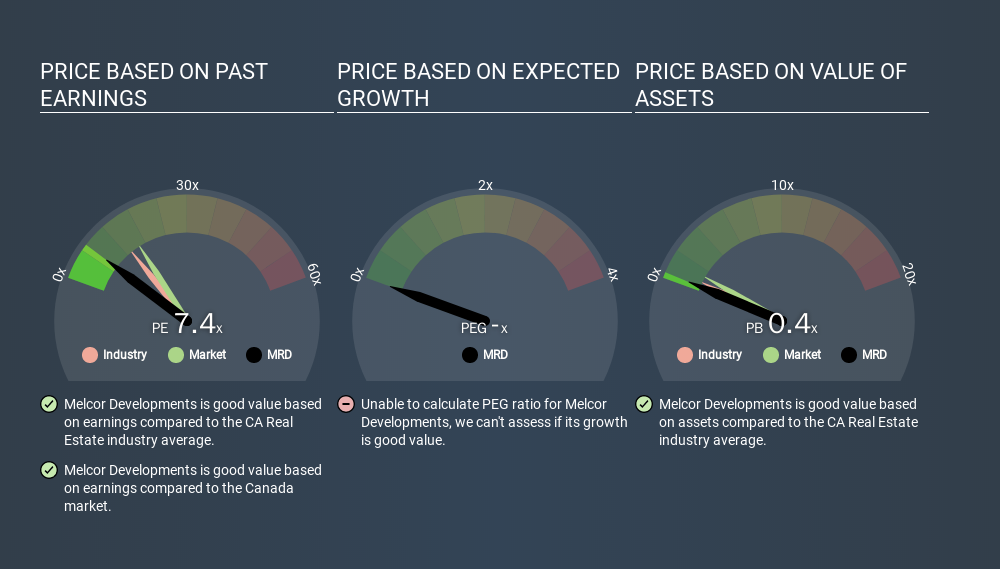- Canada
- /
- Real Estate
- /
- TSX:MRD
Does Melcor Developments Ltd.'s (TSE:MRD) P/E Ratio Signal A Buying Opportunity?
This article is for investors who would like to improve their understanding of price to earnings ratios (P/E ratios). We'll apply a basic P/E ratio analysis to Melcor Developments Ltd.'s (TSE:MRD), to help you decide if the stock is worth further research. Melcor Developments has a price to earnings ratio of 7.35, based on the last twelve months. That is equivalent to an earnings yield of about 13.6%.
View our latest analysis for Melcor Developments
How Do You Calculate A P/E Ratio?
The formula for price to earnings is:
Price to Earnings Ratio = Price per Share ÷ Earnings per Share (EPS)
Or for Melcor Developments:
P/E of 7.35 = CAD12.59 ÷ CAD1.71 (Based on the trailing twelve months to September 2019.)
Is A High Price-to-Earnings Ratio Good?
A higher P/E ratio implies that investors pay a higher price for the earning power of the business. All else being equal, it's better to pay a low price -- but as Warren Buffett said, 'It's far better to buy a wonderful company at a fair price than a fair company at a wonderful price'.
How Does Melcor Developments's P/E Ratio Compare To Its Peers?
The P/E ratio indicates whether the market has higher or lower expectations of a company. The image below shows that Melcor Developments has a lower P/E than the average (13.5) P/E for companies in the real estate industry.

Melcor Developments's P/E tells us that market participants think it will not fare as well as its peers in the same industry. Since the market seems unimpressed with Melcor Developments, it's quite possible it could surprise on the upside. You should delve deeper. I like to check if company insiders have been buying or selling.
How Growth Rates Impact P/E Ratios
Generally speaking the rate of earnings growth has a profound impact on a company's P/E multiple. That's because companies that grow earnings per share quickly will rapidly increase the 'E' in the equation. Therefore, even if you pay a high multiple of earnings now, that multiple will become lower in the future. And as that P/E ratio drops, the company will look cheap, unless its share price increases.
Melcor Developments saw earnings per share decrease by 5.5% last year. But it has grown its earnings per share by 9.9% per year over the last three years. And EPS is down 13% a year, over the last 5 years. So you wouldn't expect a very high P/E.
A Limitation: P/E Ratios Ignore Debt and Cash In The Bank
It's important to note that the P/E ratio considers the market capitalization, not the enterprise value. So it won't reflect the advantage of cash, or disadvantage of debt. The exact same company would hypothetically deserve a higher P/E ratio if it had a strong balance sheet, than if it had a weak one with lots of debt, because a cashed up company can spend on growth.
Spending on growth might be good or bad a few years later, but the point is that the P/E ratio does not account for the option (or lack thereof).
How Does Melcor Developments's Debt Impact Its P/E Ratio?
Net debt totals a substantial 159% of Melcor Developments's market cap. If you want to compare its P/E ratio to other companies, you must keep in mind that these debt levels would usually warrant a relatively low P/E.
The Bottom Line On Melcor Developments's P/E Ratio
Melcor Developments has a P/E of 7.4. That's below the average in the CA market, which is 16.1. Given meaningful debt, and a lack of recent growth, the market looks to be extrapolating this recent performance; reflecting low expectations for the future.
Investors should be looking to buy stocks that the market is wrong about. As value investor Benjamin Graham famously said, 'In the short run, the market is a voting machine but in the long run, it is a weighing machine. So this free visualization of the analyst consensus on future earnings could help you make the right decision about whether to buy, sell, or hold.
You might be able to find a better buy than Melcor Developments. If you want a selection of possible winners, check out this free list of interesting companies that trade on a P/E below 20 (but have proven they can grow earnings).
If you spot an error that warrants correction, please contact the editor at editorial-team@simplywallst.com. This article by Simply Wall St is general in nature. It does not constitute a recommendation to buy or sell any stock, and does not take account of your objectives, or your financial situation. Simply Wall St has no position in the stocks mentioned.
We aim to bring you long-term focused research analysis driven by fundamental data. Note that our analysis may not factor in the latest price-sensitive company announcements or qualitative material. Thank you for reading.
About TSX:MRD
Melcor Developments
Operates as a real estate development company in the United States and Canada.
Solid track record and good value.
Market Insights
Community Narratives



